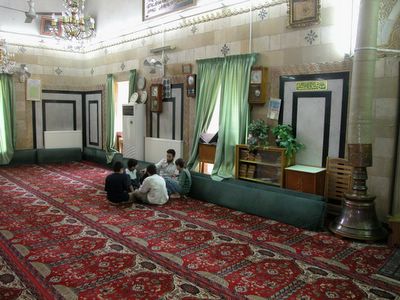Religion of Love

A religious lesson at the Mosque of Ibn Al-Arabi in Salhieh, Damascus.
Muhyiddin Ibn Arabi (1165-1240) is one of the most famous Muslim philosophers. He was born in southern Spain and lived during the golden era of openness and tolerance in Arab-ruled Andalusia. He spent years traveling around the Islamic world before finally settling in Damascus, where he completed his greatest book Al-Futuhat Al-Makkiyyah (Meccan Revelations), which is an encyclopedia of Sufism (Islamic mysticism) and Sufi teachings. He was buried in Damascus; and the Mosque, pictured above, was built in his honor by Ottoman Sultan Selim I in 1516.
Throughout his life, Ibn Arabi preached tolerance among all faiths. In one of his most famous poems, he considers his heart "a center of love":
O Marvel! a garden amidst the flames.
My heart has become capable of every form:
It is a pasture for gazelles and a convent for monks,
and a temple for idols and the pilgrim's Kaa'ba,
and the tables of the Torah and the book of the Quran.
I follow the religion of Love:
Whatever way Love's camels take,
that's my religion and my faith.

